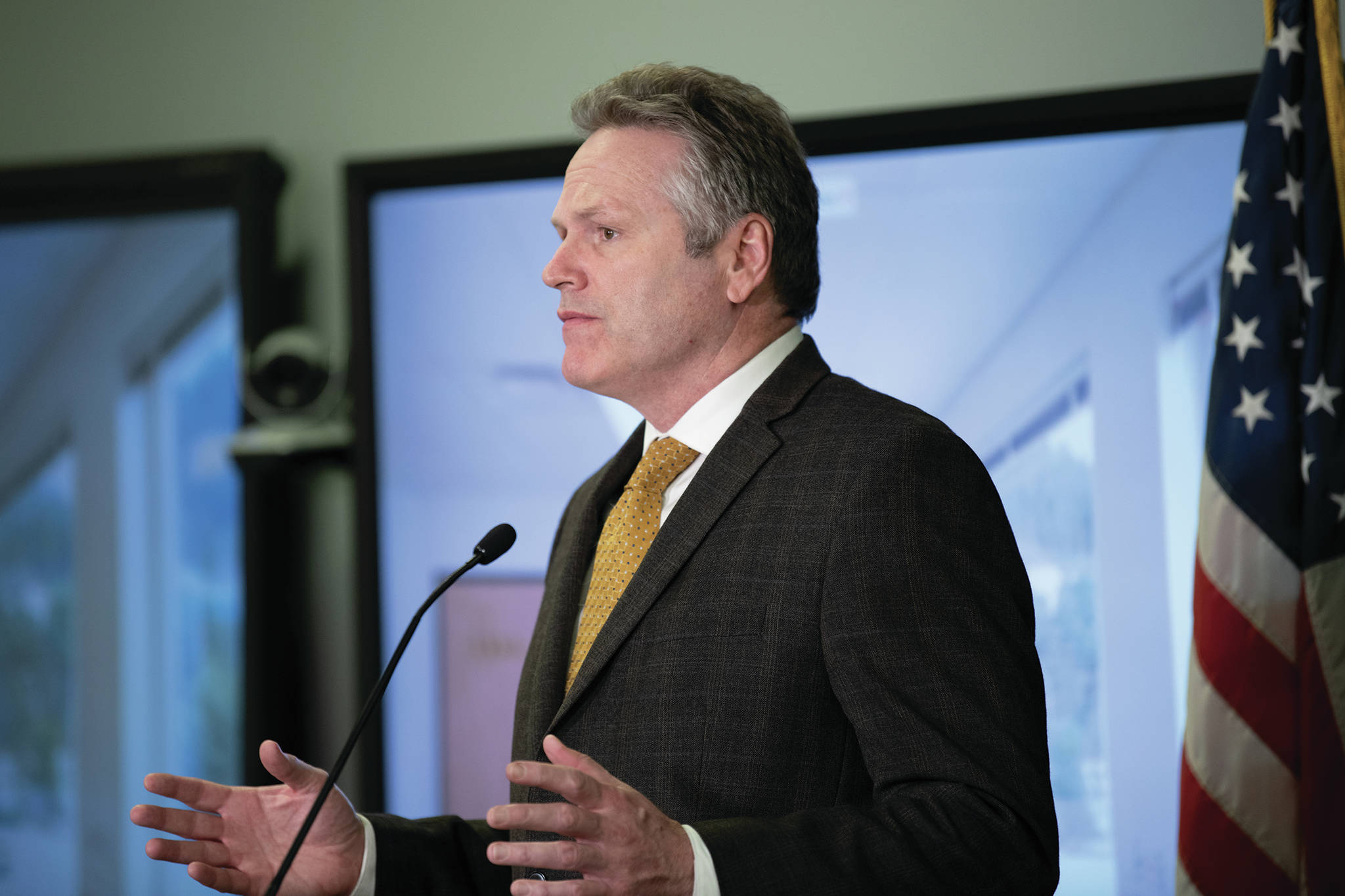As a public service to keep people informed on the COVID-19 pandemic, the paywall for all articles about the coronavirus has been disabled. If you are able, consider subscribing to the Homer News to support our continued work to bring important updates to the public. You can do so here.
The number of confirmed positive cases of COVID-19 in Alaska had its largest daily increase, with 22 new cases reported on Tuesday for the period of April 6. That brings the total to 213 cases in Alaska.
No new deaths or hospitalizations were reported, with the total number of six dead and 23 hospitalized.
“We had a pretty good caseload today,” Gov. Mike Dunleavy said in a press conference Tuesday evening. “We hope that’s not going to continue to be the norm.”
Alaska also saw its first case from the Yukon-Kuskokwim area — one case in Bethel. The other cases reported are in Anchorage (10), Fairbanks (9) and North Pole (2).
The Bethel case was associated with out-of-state travel, according to a press release from the Alaska Department of Health and Social Services.
“We are working closely with the Yukon-Kuskokwim Health Corporation and local public health nursing staff to identify people who may have been exposed to this person and offer appropriate testing, isolation, and quarantine guidance,” Alaska State Epidemiologist Dr. Joe McLaughlin said in the release. “We are making every effort to respond earnestly to this situation to prevent COVID-19 from spreading in the region.”
Of the new cases, 12 are male and 10 are female. One case is an individual aged 20-29; five are aged 30-39; three are aged 40-49; seven are aged 50-59; four are aged 60-69; one is an aged 70-79; and one is person older than 80.
Dunleavy also called for an Alaska Day of Prayer and Hope on April 10, celebrated as Good Friday in Christian faiths. The governor will be the host of a livestream event at 2 p.m. Friday in which he will offer a personal prayer for Alaska and a moment of silence. He will be joined remotely by religious and community leaders.
“In times of uncertainty, such as this global health pandemic we are fending off, prayer and hope are powerful resources that are immediately accessible to every Alaskan across every faith and religious tradition,” Dunleavy said in a press release. “I invite all Alaskans to join me this Friday as we come together to pray for and focus our positive wishes on Alaska, the country, and the world. I have no doubt that the people of this great state will emerge from this pandemic stronger, more compassionate, and more united than ever.”
DHSS also issued a health alert on Tuesday offering safety guidelines for religious services. Health Mandate 11 remains in effect prohibiting private and public gatherings of non-household members for weddings, faith gatherings, graduations and funerals. It will allow gatherings of no more than 10 people to livestream religious services provided social distancing of 6 feet. If singing or projection of voice is done, distancing must be 10 feet or more. Non-speaking or technical support staff are to wear mask coverings.
“It’s not about the entity, the business, the institutions,” Dunleavy explained. “… It’s about the interactions, people closer than 6 feet.”
The advisory also allows drive-in religious services provided each vehicle includes only household members and that cars are 6-feet apart. Participants may not interact physically with clergy, staff or people in other vehicles. That includes collecting donations by basket or plate.
Also included in the advisory are restrictions on making and distributing Easter baskets. No one can participate who is sick with respiratory symptoms or fever, or who has traveled out of state or had contact with a COVID-19 patient in the past 14 days. No more than 10 people can gather to assemble baskets, and they must wash hands with soap and water for 20 seconds before and after handling baskets.
The state also released several new health mandates and advisories. Health Mandate 005, an order issued on March 19 postponing or canceling non-elective surgeries and procedures, was revised to include an attachment better defining those procedures and extending the date to June 15. That includes surgeries such as plastic surgery, sterilization and surgical abortions, except where the life of the woman is endangered. Some minor surgeries are allowed, such as circumcision of newborn boys at the bedside before the child goes home.
When pressed by Associated Press reporter Becky Bohrer on why surgical abortions were included, DHSS Commissioner Adam Crum said the idea was to preserve staff resources and supplies of personal protective equipment.
“It’s to protect the patient, protect the health care provider,” Crum said.
At the press conference, Dunleavy said that mandates and restrictions will be revisited as the state gets more equipment and personal protective gear.
“As soon as we get that up to speed we can look at loosening some of those mandates that come with elective procedures,” he said. “… We want to get life back to normal as soon as possible.”
Chief Medical Officer Anne Zink called COVID-19 “sneaky,” and said one concern is that the novel coronavirus, SARS-CoV-2, that causes the disease, sheds in large amounts early on when someone might be infected but not show symptoms.
“We’re continuing to see people who went to work, went to the grocery store and were around others,” she said. “Even that social distancing can expose people.”
That’s why it’s important that essential workers minimize contact with others and why people should wear masks when they have to go out for supplies or other critical needs, she said. People also who don’t feel well, even with mild symptoms, should not go to work.
Reach Michael Armstrong at marmstrong@homernews.com.


